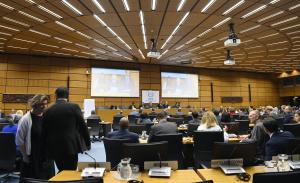Fusion energy strongly advocated
Last week the International Atomic Energy Agency (IAEA) held its annual General Conference, with delegates representing more than 130 countries and many international organizations including ITER. The conference highlights a broad range of nuclear technologies and policies—from safeguards against weapons proliferation, to technical cooperation on nuclear and radioisotopic techniques benefiting agriculture, groundwater management, and medicine. This year, the global surge in fusion energy R&D was also in the spotlight.


